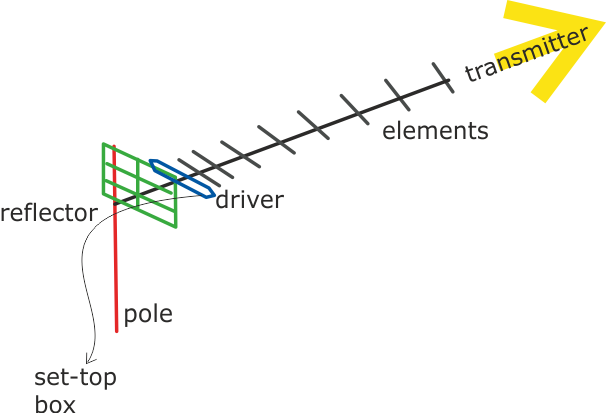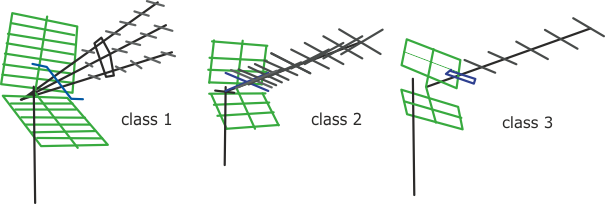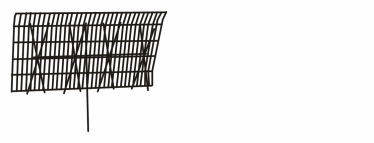Freeview reception - all about aerials
 Brian Butterworth published on UK Free TV
Brian Butterworth published on UK Free TV Updated 8th January 2014.
Your ability of receive all the Freeview transmissions depends on the suitability of aerial
- the design style,
- the "group", and
- its physical location.
Standard type - Yagi aerial

The standard type of TV aerial is known as the Yagi aerial. It is mounted on a pole, and consists of a rod with a reflector (shown green) at the back and many spiky elements (in grey) at the front. The connecting cable connects to the element nearest the reflector, known as the driver (shown in blue).
These Yagi aerials are directional and so pick up signals best from a transmitter that the rod points towards. The more elements the aerial has, the better it picks up a signal and becomes more directional.
A standard-type aerial is all that is required for digital TV reception in most places. These antennae have between 10 and 18 elements and a single reflector. These are recommended for new installations for good digital television reception, but will more often than not function perfectly in good reception areas.
Typically these aerials are designed to receive only some transmission frequencies - see "groups" below.
High Gain aerials

These aerials are designed for poor digital reception areas, and have two reflectors. For maximum signal strength, some digital high gain aerials have up to 100 elements. Since the switchover to digital-only transmissions back in October 2012, most UK households now have good quality digital TV signals.
A more expensive aerial is only required where the signal strength is low, but can often provide the whole Freeview reception where it might otherwise be impossible.
The CAI (that represents aerial installers) has four standards for digital TV aerials. The highest standard "1" is for homes on the fringes of coverage areas, intermediate standard "2" is suitable for use within the coverage area; minimum standard "3" is for good coverage conditions.
These aerials can be either wideband, or receive only selected frequencies - see "groups" below.
Grid

You may haved used a 'Grid aerial' for analogue reception, but as they are generally unsuitable for Freeview reception, they have now generally been replaced by the Yagi type. However in some places a Grid aerial installation may work for Freeview: otherwise replace with a standard Yagi aerial.
Indoor
Indoor aerials are generally not suitable for Freeview reception. In areas of good signal strength it is often possible to receive some transmissions. Even where an aerial works, people often find that may get interruptions to their viewing (or recording).Loft mounted
Loft mounted arrivals are not generally recommended for Freeview reception, as the roof tiles and plumbing will degrade the signal. Some compensation for this loss of signal can be made by using satellite-grade cable to connect the set top box to the aerial.Positioning
The best position for a TV aerial is mounted outdoors, as high from the ground as possible, pointing directly at the transmitter. The signal can be blocked by hills and tall buildings. It should be positioned away from any other aerials.Horizontal or vertical?
The transmitter will either use vertical mode which requires the elements of your aerial to be up-down, or horizontal mode which requires them to be level with the ground.Groups
Both analogue and digital television is transmitted the same group of transmission frequencies (known as channel 21 through to 60). A coloured marking on the aerial shows the group.
To create the best possible analogue picture, TV transmissions from adjacent transmitters have been designated to several different groups of frequencies. By using an aerial that receives only the channels in the correct group, the analogue picture can be kept free from interference.
To receive Freeview transmissions from the same transmitter it has been sometimes necessary to use frequencies that are not part of the transmitter's normal group. When this has occurred, the aerial will need to be replaced with a "wideband" aerial (also known as group W) - one that covers every group.
As Ofcom is planning to move the TV frequencies again - perhaps as soon as 2018 - it may be wise to use a wideband aerial if you can to ensure you can keep viewing Freeview for many years to come.
Help with Television sets?
Friday, 9 September 2011
M
Mike Dimmick4:42 PM
Geoff: At 25km from Mendip you'll probably be OK with a loft aerial, though you do have to ensure it's aiming through tiles rather than brickwork, and avoid reflective surfaces in the loft. I'd go with a 40-element log-periodic, see Online TV FM DAB Aerial sales .
See Loft and indoor aerial installations for TV, FM and DAB and http://wrightsaerials.tv/….pdf .
As the others have said, if you *can* fit it outside, you should. I'd still go with the Log40 or you could maybe go one size down.
| link to this comment |
Saturday, 10 September 2011
C
christine reeves8:20 AM
QI have sky multlroom in louge and three other rooms. Is
There a cheaper opn. Also if when you record wlth skyplus you get interference on playback such as picture freeze and sound breakup, is box at fault or bad dish alignment
| link to this comment |
christine reeves: First, yes, just cancel the multiroom part of your subscription and the boxes will become fSfS (Freesat from Sky) boxes - see All free-to-watch channels | ukfree.tv - independent free digital TV advice - or you can swap them out for Freesat boxes All free-to-watch channels | ukfree.tv - independent free digital TV advice if you want HD.
Sounds like there is a problem with the "second dish input" on the Sky+HD box, it is unlikely to be a dish alignment problem if no other boxes are effected.
| link to this comment |
S
Steve P10:11 AM
So would you suggest that she switches the leads from the dish round?
Which will either switch the problem from recorded to live, or if lucky cure it if it was a corroded/dirty contact?
| link to this comment |
Sunday, 11 September 2011
A
alan3:11 PM
West Wickham
Hi - Can anyone help.I would like to instal my own aerial for digital reception.
Is this possible?
I am in the BR4 area(Bromley, Kent) and can see Crystal Palace tower from my home.
| link to this comment |
alan's: mapA's Freeview map terrainA's terrain plot wavesA's frequency data A's Freeview Detailed Coverage
J
jb384:19 PM
alan: As you are only 4 miles away from Crystal Palace, I would be inclined to use a standard log periodic type aerial in the loft, provided that is that you dont have to face it into a water tank to obtain the correct angle for the transmitter, and also that it isnt facing through the adjoining walls of other properties, as if it is, then gutter mount it. (Fixings permitting!)
| link to this comment |
J
jb384:36 PM
alan: Something like as seen in the link would suffice, as you don't want to over do it then suffer from overloading problems come next April when Crystal Palace switches to high power operation.
Online TV FM DAB Aerial sales
| link to this comment |
M
Mazbar6:59 PM
Ormskirk
Jb38 one thing to remember when instaling an aerial in the loft if you have foil insulation mounted to the beams this will block all the signal no matter how strong, i have come accross this and it is a pain every bit of information helps have a great night
| link to this comment |
Mazbar's: mapM's Freeview map terrainM's terrain plot wavesM's frequency data M's Freeview Detailed Coverage
alan: If you must really use a loft aerial, and I would suggest you use a rooftop aerial if you possibly can, the official advise is to make sure you use satellite-grade coaxial cable to connect it to the TV set, to offset the losses caused by putting the aerial in an unsuitable location.
| link to this comment |
J
jb388:09 PM
Mazbar: Yes! you are quite correct on this, and indeed I should have added this qualification to the others mentioned.
| link to this comment |
Select more comments
Your comment please!